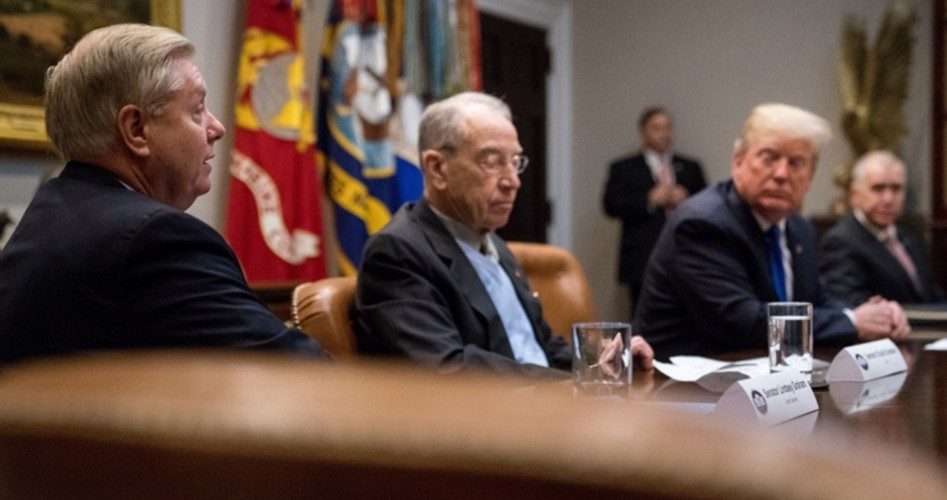
The memo released earlier this week by Senators Chuck Grassley (R- Iowa, center) and Lindsey Graham (R-S.C., left) detailing their criminal referral against Trump “dossier” author Christopher Steele confirms what Democrats have denied: The FISA warrant allowing the FBI and DOJ to spy on former Trump campaign advisor Carter Page leaned so heavily on that “dossier” that the warrant would not have been sought — much less approved — without it.
Even as Democrats — especially and including Representative Adam Schiff (D-Calif.) — continue to dispute the claims of the Republican FISA memo, more evidence is coming to light to support the memo’s claims that the FBI and DOJ abused the FISA process to spy on an American citizen.
In particular, Democrats have claimed that the spurious, unconfirmed Trump “dossier” was crucial to the application for a FISA surveillance warrant for those agencies to spy on Page. Since the “dossier” has been completely discredited and that it is now known that the wife of a DOJ official was paid by Fusion GPS to help manufacture it, it is easy to understand why Democrats would want to put distance between it and the FISA warrant that helped get the “Trump/Russia collusion” ball rolling.
But gaining that distance is becoming increasingly difficult, if not outright impossible. The eight-page Grassley-Graham memo confirms — in an official referral for criminal investigation — that the “dossier” was such a foundational part of the FISA warrant application that it was used four times: once in the initial application and once in each subsequent application for continuing the surveillance of Page. In contrast to Democrats’ claims, the memo states that the FISA warrant applications “relied heavily on Mr. Steele’s dossier claims.”
The relevant portion of the Grassley-Graham memo states:
On March 17, 2017, the Chairman and Ranking Member were provided copies of the two relevant FISA applications, which requested authority to conduct surveillance on Carter Page. Both relied heavily on Mr. Steele’s dossier claims, and both applications were granted by the Foreign Intelligence Surveillance Court (FISC). In December of 2017, the Chairman, Ranking Member and Subcommittee Chairman Graham were allowed to review a total of four FISA applications relying on the dossier to seek surveillance of Mr. Carter Page, as well as numerous other documents relating to Mr. Steele.
The Grassley-Graham memo, dated January 4, was originally released in a more heavily redacted form before being released in its current form with fewer redactions. And while much is still redacted, what can be seen is clear evidence that the Republican FISA memo authored by House Intelligence Committee Chairman Devin Nunes (R-Calif.) was correct and accurately represented the role the “dossier” played in the FISC (Foreign Intelligence Surveillance Court, or FISA court) approving the warrant application.
This is particularly damning to the FBI and DOJ, because it means that the other claims of the Republican memo — which rested on that claim — are also correct; namely, that the FBI and DOJ presented a document to the court as evidence when they knew all along that the document was questionable and that the document’s author (perhaps novelist would be a better word) had lied to the FBI and was himself untrustworthy and that the FBI and DOJ hid those facts from the court.
The Grassley-Graham memo carries considerable weight, since both Grassley and Graham have seen the actual FISA warrants and were able to base their referral for criminal investigation of Steele on the information found in those warrants. Furthermore, this confirms another important piece of the Republican FISA memo — that there would never have been a FISA warrant for surveillance of Page in the absence of the “dossier” alleging that Donald Trump was both the victim of blackmail and the recipient of assistance at the hands of Russian agents. The Republican FISA memo points to this fact by stating that then-Deputy FBI Director Andrew McCabe (who suddenly resigned when the House Intelligence Committee voted to release the memo to the public) had “testified before the Committee in December 2017 that no surveillance warrant would have been sought from the FISC without the Steele dossier information.” So all four warrant applications “relied” so “heavily” on the “dossier” that the FBI obviously did not think the information agents gathered on their own would meet the standard of probable cause without the “information” contained in the “dossier.”
As alluded to above, the Grassley-Graham memo is also lent considerable credibility since it is an official referral for criminal investigation. It would not end well for either of the senators whose signatures appear on that referral if the information contained in that referral were bogus.
When one begins to tally all of the evidence of FISA abuses committed by the FBI and DOJ in the process of obtaining the warrant, it becomes obvious that the denials heard from Democrats are little more than a last-ditch effort to muddy the waters in vain hope that the truth will not be quite so clear. That truth is that the FBI and DOJ — in a nakedly political move — used a document they knew was untrustworthy to abuse the FISC to obtain a warrant on an American citizen as part of a political witch-hunt. Of course, many of those Democrats are the same ones who are up to their necks in promoting what is becoming increasingly obvious as a false narrative of Trump/Russia collusion while it was the DNC and Clinton campaign that can be seen to have direct ties to Russia.
Photo: AP Images




